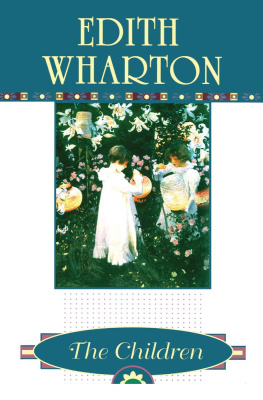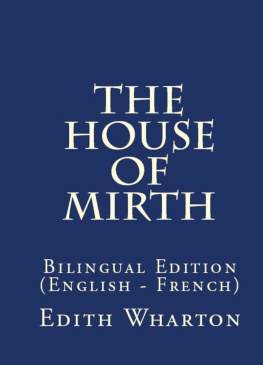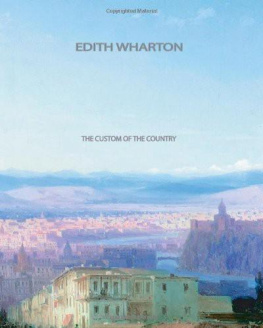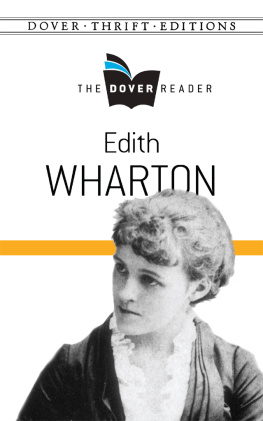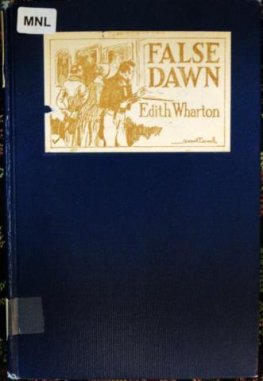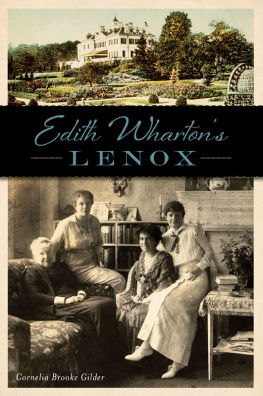O THER B OOKS BY E DITH W HARTON
The Age of Innocence
A Backward Glance
The Children
The Custom of the Country
The Ghost Stories of Edith Wharton
The Glimpses of the Moon
The House of Mirth
Madame de Treymes and Three Novellas
The Mothers Recompense
Old New York
The Reef
Roman Fever and Other Stories
To Gaillard Lapsley

Scribner
An Imprint of Simon & Schuster, Inc.
1230 Avenue of the Americas
New York, NY 10020
www.SimonandSchuster.com
Copyright 1924, 1925 by Charles Scribners Sons
Copyright 1925 by The Yale Publishing Association, Inc.
Copyright renewed 1953 by Frederic R. King
Introduction copyright 2022 by Brandon Taylor
Previously published in 1997 by Touchstone, an imprint of Simon & Schuster.
All rights reserved, including the right to reproduce this book or portions thereof in any form whatsoever. For information, address Scribner Subsidiary Rights Department, 1230 Avenue of the Americas, New York, NY 10020.
This Scribner trade paperback edition June 2022
SCRIBNER and design are registered trademarks of The Gale Group, Inc., used under license by Simon & Schuster, Inc., the publisher of this work.
For information about special discounts for bulk purchases, please contact Simon & Schuster Special Sales at 1-866-506-1949 or
The Simon & Schuster Speakers Bureau can bring authors to
your live event. For more information, or to book an event, contact
the Simon & Schuster Speakers Bureau at 1-866-248-3049 or visit
our website at www.simonspeakers.com.
Library of Congress Cataloging-in-Publication Data
Names: Wharton, Edith, 18621937, author. | Taylor, Brandon (Brandon L. G.), writer of introduction.
Title: The writing of fiction / Edith Wharton ; with an introduction by Brandon Taylor.
Description: Scribner trade paperback edition. | New York : Scribner, 2022.
Identifiers: LCCN 2022001628 | ISBN 9780684845319 (paperback) | ISBN 9781982145903 (ebook)
Subjects: LCSH: FictionAuthorship. | Creative writing.
Classification: LCC PN3355 .W5 2022 | DDC 808.3dc23/eng/20220421
LC record available at https://lccn.loc.gov/2022001628
ISBN: 978-0-6848-4531-9
ISBN: 978-1-4767-9056-5(eBook)
I

In General
I

In General
I
To treat of the practice of fiction is to deal with the newest, most fluid and least formulated of the arts. The exploration of origins is always fascinating; but the attempt to relate the modern novel to the tale of Joseph and his Brethren is of purely historic interest.
Modern fiction really began when the action of the novel was transferred from the street to the soul; and this step was probably first taken when Madame de La Fayette, in the seventeenth century, wrote a little story called La Princesse de Clves, a story of hopeless love and mute renunciation in which the stately tenor of the lives depicted is hardly ruffled by the exultations and agonies succeeding each other below the surface.
The next advance was made when the protagonists of this new inner drama were transformed from conventionalized puppetsthe hero, the heroine, the villain, the heavy father and so oninto breathing and recognizable human beings. Here again a French novelistthe Abb Prvostled the way with Manon Lescaut; but his drawing of character seems summary and schematic when his people are compared with the first great figure in modern fictionthe appalling Neveu de Rameau. It was not till long after Diderots death that the author of so many brilliant tales peopled with eighteenth century puppets was found, in the creation of that one sordid, cynical and desolately human figure, to have anticipated not only Balzac but Dostoievsky.
But even from Manon Lescaut and the Neveu de Rameau, even from Lesage, Defoe, Fielding, Smollett, Richardson, and Scott, modern fiction is differentiated by the great dividing geniuses of Balzac and Stendhal. Save for that one amazing accident of Diderots, Balzac was the first not only to see his people, physically and morally, in their habit as they lived, with all their personal hobbies and infirmities, and make the reader see them, but to draw his dramatic action as much from the relation of his characters to their houses, streets, towns, professions, inherited habits and opinions, as from their fortuitous contacts with each other.
Balzac himself ascribed the priority in this kind of realism to Scott, from whom the younger novelist avowedly derived his chief inspiration. But, as Balzac observed, Scott, so keen and direct in surveying the rest of his field of vision, became conventional and hypocritical when he touched on love and women. In deference to the wave of prudery which overswept England after the vulgar excesses of the Hanoverian court he substituted sentimentality for passion, and reduced his heroines to Keepsake insipidities; whereas in the firm surface of Balzacs realism there is hardly a flaw, and his women, the young as well as the old, are living people, as much compact of human contradictions and torn with human passions as his misers, his financiers, his priests or his doctors.
Stendhal, though as indifferent as any eighteenth century writer to atmosphere and local colour, is intensely modern and realistic in the individualizing of his characters, who were never types (to the extent even of some of Balzacs) but always sharply differentiated and particular human beings. More distinctively still does he represent the new fiction by his insight into the springs of social action. No modern novelist has ever gone nearer than Racine did in his tragedies to the sources of personal, of individual feeling; and some of the French novelists of the eighteenth century are still unsurpassed (save by Racine) in the last refinements of individual soul-analysis. What was new in both Balzac and Stendhal was the fact of their viewing each character first of all as a product of particular material and social conditions, as being thus or thus because of the calling he pursued or the house he lived in (Balzac), or the society he wanted to get into (Stendhal), or the acre of ground he coveted, or the powerful or fashionable personage he aped or envied (both Balzac and Stendhal). These novelists (with the solitary exception of Defoe, when he wrote Moll Flanders) are the first to seem continuously aware that the bounds of a personality are not reproducible by a sharp black line, but that each of us flows imperceptibly into adjacent people and things.
The characterization of all the novelists who preceded these two masters seems, in comparison, incomplete or immature. Even Richardsons seems so, in the most penetrating pages of Clarissa Harlowe, even Goethes in that uncannily modern novel, the Elective Affinitiesbecause, in the case of these writers, the people so elaborately dissected are hung in the void, unvisualized and unconditioned (or almost) by the special outward circumstances of their lives. They are subtly analyzed abstractions of humanity, to whom only such things happen as might happen to almost any one in any walk of lifethe inevitable eternal human happenings.
Since Balzac and Stendhal, fiction has reached out in many new directions, and made all sorts of experiments; but it has never ceased to cultivate the ground they cleared for it, or gone back to the realm of abstractions. It is still, however, an art in the making, fluent and dirigible, and combining a past full enough for the deduction of certain general principles with a future rich in untried possibilities.
Next page
